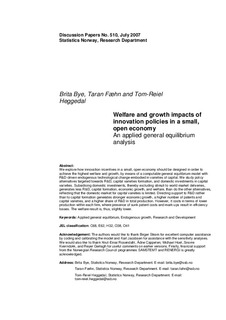Welfare and growth impacts of innovation policies in a small, open economy. An applied general equilibrium analysis
Working paper

Åpne
Permanent lenke
http://hdl.handle.net/11250/180195Utgivelsesdato
2007Metadata
Vis full innførselSamlinger
- Discussion Papers [1003]
Sammendrag
We explore how innovation incentives in a small, open economy should be designed in order to
achieve the highest welfare and growth, by means of a computable general equilibrium model with
R&D-driven endogenous technological change embodied in varieties of capital. We study policy
alternatives targeted towards R&D, capital varieties formation, and domestic investments in capital
varieties. Subsidising domestic investments, thereby excluding stimuli to world market deliveries,
generates less R&D, capital formation, economic growth, and welfare, than do the other alternatives,
reflecting that the domestic market for capital varieties is limited. Directing support to R&D rather
than to capital formation generates stronger economic growth, a higher number of patents and
capital varieties, and a higher share of R&D in total production. However, it costs in terms of lower
production within each firm, where presence of sunk patent costs and mark-ups result in efficiency
losses. The welfare result is, thus, slightly lower.
Keywords: Applied general equilibrium, Endogenous growth, Research and Development
Utgiver
Statistics Norway, Research DepartmentSerie
Discussion Papers;No. 510Beslektede innførsler
Viser innførsler beslektet ved tittel, forfatter og emneord.
-
The impacts of alternative policy instruments on environmental performance. A firm level study of temporary and persistent effects
Bye, Brita; Klemetsen, Marit Elisabeth (Discussion papers;788, Working paper, 2014-10)We study the effects of various environmental regulations on environmental performance measured as emission intensity. Moreover, we aim to test whether any such effects are persistent or only temporary. Conventional theory ... -
The welfare effects of carbon policies: grandfathered quotas versus differentiated taxes
Bye, Brita; Nyborg, Karine (Discussion Papers;No. 261, Working paper, 1999)Recently, it has been demonstrated that pre-existing distortionary taxes can substantially increase the costs of market-based instruments which do not raise revenue, such as non-auctioned emissions quotas. Revenue-raising ... -
Labour market rigidities and environmental tax reforms : welfare effects of different regimes
Bye, Brita (Discussion Papers;No. 242, Working paper, 1998)The working of the labour market is important for the total welfare effects of tax reforms. This paper analyses, by using a computable general equilibrium model for the Norwegian economy, how different assumptions about ...